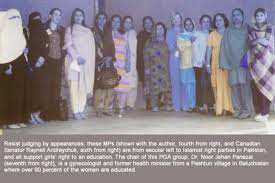New U.S. Policy in AfPak: Looking for Mr. Moderate Taliban

To those who advocate making peace with certain elements of the Taliban, the author, who has worked to secure human rights with Pakistani legislators across the ideological spectrum, argues against any prospective deal that sacrifices women’s empowerment.
There is a new knock, knock joke doing the rounds in the Lahore tea circles.
"Knock, knock."
"Who is there?"
"It's U.S. Special Forces."
"What do you want?"
"We are looking for Mr. Moderate Taliban to talk to our leader, Mullah Obama."
"There is no one here but us, the real Taliban; we are bearded, armed, and we don't allow our girls to go to school or go outside."
"It's ok, he still wants to talk to you if you only oppress your own women and don't attack us."
As the Obama Administration reviews its policy on Afghanistan and Pakistan, or "AfPak" as its envoy Ambassador Richard Holbrooke calls it, the dilemma is clear. Here is an administration of liberal values, a president who has risen to the highest, most powerful political office in the world with the benefit of a first-class education, and a secretary of state who has declared her mandate to be the empowerment of women and girls. Their greatest foreign policy challenge: an anti-western, militant and chauvinistic movement gaining strength in the mountain villages and towns of Southwest Asia. It's a volatile area marked by narcotics and weapons' smuggling, political corruption and incompetence, and failed military regimes. Crucial trade routes from Central Asia to the Persian Gulf run through this nuclear-armed region of 200 million people. Direct military operations to secure this region—by NATO in Afghanistan or the U.S. proxy war using drones and the Pakistani Army in Western Pakistan—have shown their limits.
The Taliban have proved resilient, overcoming local populations by a mix of ruthlessness and psychological warfare: targeted beheadings announced the night before on FM radio, hundreds of girls' schools blown up, barber shops and music and video stores forced to shut down. Both Afghan and Pakistani administrators have alternated between military operations, scorched-earth policies and appeasement deals accepting sharia law on Taliban terms.
How is the Obama Administration—or the weak elected governments in Kabul and Islamabad—to respond? Many armchair analysts here, such as Fareed Zakaria of Newsweek and Leslie Gelb in the New York Times Op-ed pages, are recommending splitting the Taliban into moderates we can do business with and terrorists that we cannot deal with. Some of this thinking is also crossover from the military officials in charge of the Iraq war, namely General David Petraeus. Kabul, Peshawar and Islamabad are also opening dialogue and suing for peace with “moderate elements” within the Taliban.
What criteria can we and should we use to separate the two? Since 2005 I have been working with Islamist parliamentarians in the Pashtun heartland, as part of the Parliamentarians for Global Action and a UN/AIDs South Asian regional seminar series. As elsewhere in the world, appearances are often deceptive; some of the most progressive MPs with PhDs were fully veiled women, and many clean-shaven men with clipped British accents were the most conservative. These are my recommendations for finding moderates.
- Any leader whose own daughters are being educated without restriction on grade level or subjects: a moderate;
- Any leader whose mother, sisters, wife are educated without restriction on grade level or subjects: a moderate;
- Any leader who is willing to take the women and girls of his family to a male physician if he is the doctor on duty at the hospital/clinic: a moderate;
- Any leader whose female family members have paid employment or are self-employed: a moderate;
- Any leader who has killed or advocated killing of individuals or groups that disagree with his viewpoint: not eligible for moderate status.
These criteria are fully in line with Islamic teachings on education, health and employment; they are accepted under the constitutions of Afghanistan and Pakistan and are in line with the United Nations’ Charter and the Millennium Development Goals, which all member states, including the 53 Muslim countries, have accepted to reach by 2015. They are simple, objective and easily verifiable; and not about appearances such as the length of someone's beard, or whether the women in their family are veiled, which is a personal and cultural choice. Girls’ education in particular is a powerful engine for economic growth and community development and stability. The most ardent proponent of how educating girls enhances a nation’s GDP growth is the chief economist on the Obama team, Larry Summers, whose influential paper at the World Bank nearly two decades ago led to change in development policy across the world. Today investors look to a country’s gender policy as a gauge for future economic growth. Girls’ education is not only sound economic policy, it is also sound security policy. The World Bank and the UN use human development and human security criteria as indicators of a country’s development levels.
Hence, the Obama Administration should mandate that any deals negotiated with Taliban guarantee access to education, healthcare and employment for women and girls in the region in exchange for drawing down our military operations. These are fundamental American values, but they are also constitutional rights within Afghan and Pakistani law.
Making women's empowerment a vehicle for security policy would also mitigate the primary criticism American policy faces in the region: the rising public resentment and opposition to military operations. By sticking to our moral principles, in accordance with the UN Charter and other universally accepted standards of socio-economic rights, we would ensure that the people of Southwest Asia see our interest and involvement as a shared responsibility and not as it is currently viewed, as yet another imperial interference.
More articles by Category: International, Politics, Violence against women
More articles by Tag:



























